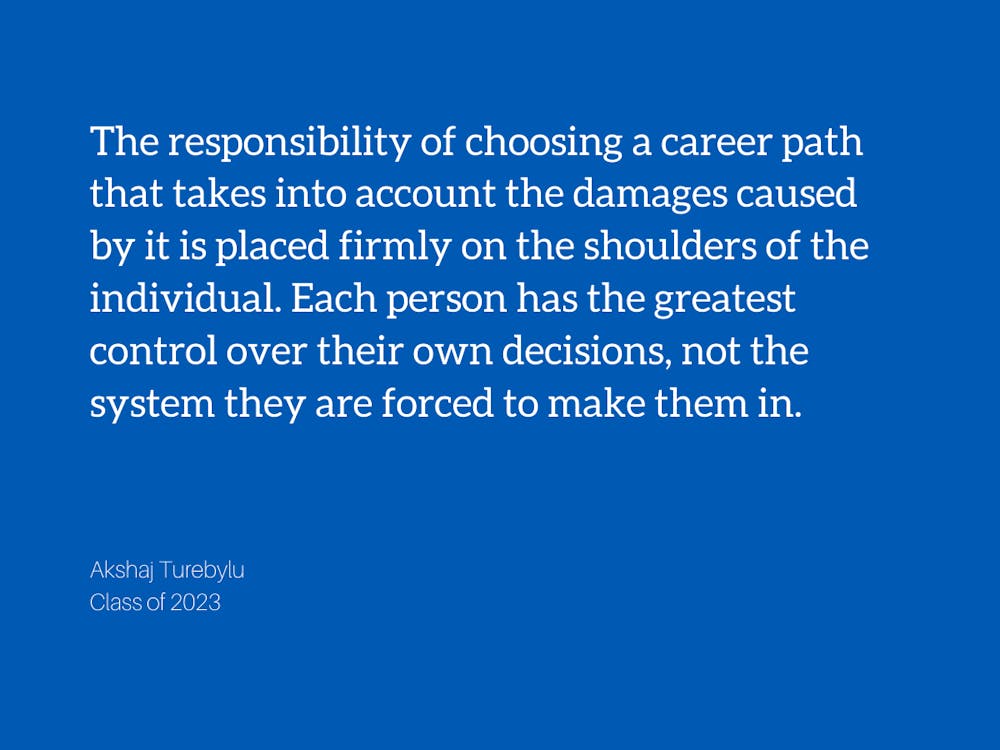Two weeks ago, I tackled what I saw as a form of stigmatization that exists against the pre-professional track at Duke. I wanted to refute the idea that choosing a career for financial stability or other material reasons is a “shallow” way to live life. Although I feel I have worked to legitimate the choice to become a preprofessional, that does not mean there are no problems with the pre-professional track, especially as it exists at Duke.
Given the immense power and influence professionals (lawyers, financiers, doctors) have on the world, there is a responsibility placed on them to maintain ethical principles. There are professional ethics that can be codified by ERBs (Ethics Review Boards), but I want to focus on personal ethics. These restrictions cannot be placed on the actor by the market or the institution they work in, but should be accepted by individuals themselves as an act of good practice.
The strongest unaddressed criticism of my previous article was the reality that pre-professionals students feed into destructive or harmful institutions, a topic previous opinion pieces have touched on. While it is true that economics majors can go on to finance and run operations that hurt others, this does not require a rebuke of the entire pre-professional track. What I wish to emphasize is that one should feel legitimate in the choice to be pre-professional, but have a sense of responsibility to refuse unethical opportunities.
Take, for instance, the medical profession. As I discussed last time, a pre-med student can begin to live with a form of false consciousness regarding their choice to pursue medicine (believing they are acting out a desire to help others), when in reality, this is simply a statement caused by the alienation of being stigmatized for choosing to be pre-med. Rather than feeling comfortable in their decision, they feel pressure to put on a front of charity in order to justify their choice.
Ultimately, this hurts everyone involved. The student enters the profession without a proper understanding of their intent (and often acting in a deceptive manner), the medical profession itself is inundated with doctors who profess to care (but are not actually engaged), and the future patients of these doctors will have worse access to care due to the motivational confusion experienced by their healthcare provider. By accepting their true intent, the pre-med student is able to better make a decision regarding their choice to stay in the medical path, avoid making deceptive moves (claiming and acting as if one is philanthropic, while not genuinely believing in philanthropy), and be a better doctor through an acceptance of one’s own position relative to the medical field.
Not only is the individual doctor threatened by pretense, the entire field of medicine comes under threat from disingenuous practitioners. This is partly cultivated by a field which demands that doctors “prove their commitment to help others.” Once they have achieved the goal of reaching medical school and can rest on their laurels as achieved professionals, the field is filled with confused and uncertain practitioners, rather than those who genuinely wished to be healers in the first place. I don’t mean to say that genuine philanthropists don’t exist among doctors, but rather that they are a rare breed compared to the (self)-deceptive kind. Is it any wonder, then, that medicine is plagued by corruption, over-prescription, and professional burn-out?
Those who choose to continue down the medical path, once they have understood their true intention, have a responsibility, then, to work in their field as is best for those who depend upon it. Of course, the structure of capitalism makes ethical decisions that are against financial wellbeing difficult to make, but it is important to do so to maintain one’s integrity. Due to our system of competition, if one lawyer refuses to act unethically, another may step in and be paid handsomely for it. Despite this systemic problem, what I want to emphasize here is that one can make ethical decisions (even with some personal loss) and come out the other end better off. Duke shouldn’t remove its connections to questionable partners. Rather, the students should refuse to engage with corporations that don’t hold high standards for themselves.
I understand that each person has a different view of ethics, and I am not preaching a universalist ethics that should apply to pre-professionals. Rather, each pre-professional has the responsibility to critically and carefully consider their decisions in fields using the moral principles they hold. What I fear is that this self-reflection is rather rare, or overridden by financial interests. I can’t command all pre-professionals to ignore lucrative careers supporting the military-industrial complex; I can, however, ask that they take time to seriously consider the weight of their actions.
Of course, the range of this responsibility is limited. Some students will take the opportunity (creating a collective action problem) to work for dubious companies. The refusal of a single Duke student will not lead to systemic change. My main concern, however, is for the integrity and ethicality of the single student. The responsibility of choosing a career path that takes into account the damages caused by it is placed firmly on the shoulders of the individual. Each person has the greatest control over their own decisions, not the system they are forced to make them in. Use this control, this agency, to reject evil in your personal career. Systemic change is done piece by piece.
Akshaj Turebylu is a Trinity first-year. His column, "ways and means," runs on alternate Wednesdays.
Get The Chronicle straight to your inbox
Signup for our weekly newsletter. Cancel at any time.

